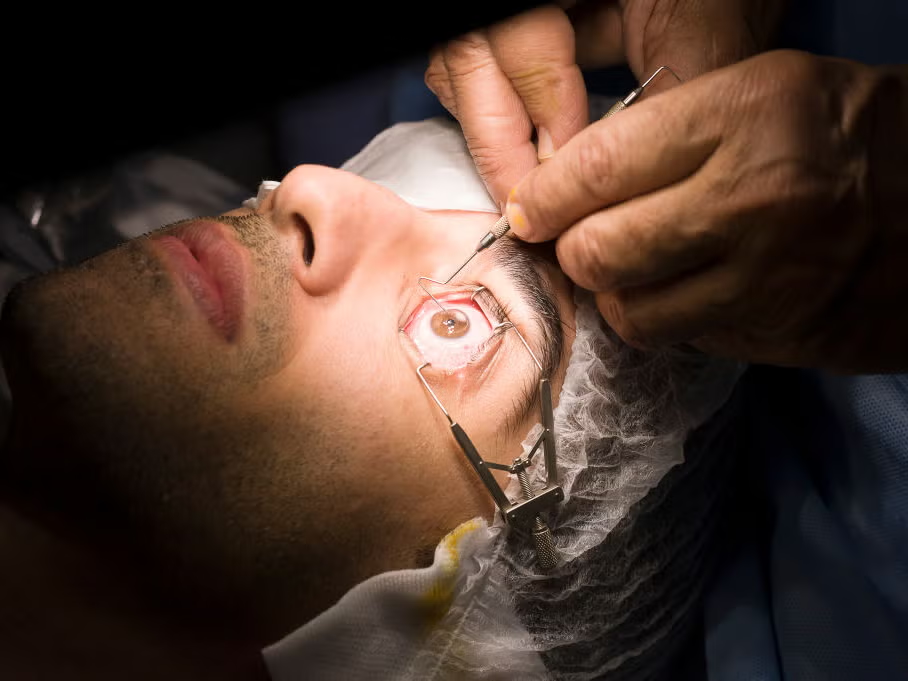Introduction
LASIK (Laser-Assisted In Situ Keratomileusis) eye surgery is one of the most popular and effective methods to correct vision problems such as nearsightedness, farsightedness, and astigmatism. If you’re considering improving your vision without glasses or contacts, understanding what LASIK eye surgery is and how it works is the first step.
This beginner’s guide covers the procedure, the science behind it, candidate suitability, and what to expect before and after surgery.
What Is LASIK Eye Surgery?
LASIK is a laser vision correction procedure that reshapes the cornea — the clear front surface of the eye — to improve how light is focused onto the retina. By reshaping the cornea, LASIK can correct refractive errors that cause blurry vision.
How Does LASIK Work? Step-by-Step
- Initial Preparation:
The eye is numbed with anesthetic eye drops to ensure a painless procedure. You will be awake during the surgery. - Creating the Corneal Flap:
Using a precision laser (femtosecond laser) or microkeratome blade, the surgeon creates a thin, hinged flap on the cornea’s surface. - Reshaping the Cornea:
The flap is lifted gently, and an excimer laser removes microscopic amounts of corneal tissue underneath. This reshaping adjusts the cornea’s curvature to correct your specific vision problem. - Replacing the Flap:
The flap is carefully repositioned back onto the eye, acting as a natural bandage. It adheres without stitches and begins healing immediately. - Recovery:
The whole procedure typically takes about 10-15 minutes per eye. Vision improvement is often noticeable within hours, with full recovery in a few days to weeks.
Who Is a Good Candidate for LASIK?
Not everyone is suitable for LASIK surgery. Ideal candidates generally have:
- Stable vision prescription for at least 1 year
- Age 18 or older (corneas should be fully developed)
- Mild to moderate nearsightedness, farsightedness, or astigmatism
- Healthy eyes with no infections or severe dry eye syndrome
- Adequate corneal thickness to safely create the flap
- No history of autoimmune diseases or certain eye conditions like keratoconus
Benefits of LASIK Eye Surgery
- Rapid vision improvement
- Little to no pain during and after the procedure
- Quick recovery and return to daily activities
- Long-lasting results with a high success rate
- Reduced dependency on glasses or contact lenses
Potential Risks and Considerations
While LASIK is generally safe, there are some risks:
- Dry eyes or temporary visual disturbances (halos, glare)
- Undercorrection or overcorrection requiring enhancement
- Rare complications like flap issues or infection
A thorough preoperative evaluation by an experienced surgeon is essential to minimize risks.
What to Expect Before and After LASIK
Before Surgery:
- Comprehensive eye exam
- Discussion of medical history and expectations
- Avoid wearing contact lenses for a period before surgery (usually 1-2 weeks)
After Surgery:
- Use prescribed eye drops to prevent infection and inflammation
- Avoid rubbing your eyes
- Attend follow-up appointments for monitoring
- Avoid swimming, heavy exercise, and makeup for a few weeks
Conclusion
LASIK eye surgery is a proven, effective way to improve vision and reduce reliance on corrective lenses. Understanding how LASIK works and whether you are a good candidate helps set realistic expectations and prepares you for a successful outcome.
If you are considering LASIK, consult a qualified eye surgeon who can evaluate your eyes and guide you through the process safely.




